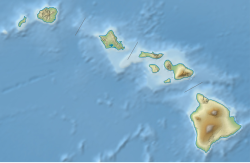Puʻuwai, Hawaii
This article needs additional citations for verification. (August 2008) |
Puʻuwai, Hawaii | |
|---|---|
Location in Hawaii and the United States | |
| Coordinates: 21°54′7″N 160°12′15″W / 21.90194°N 160.20417°W | |
| Country | United States |
| State | Hawaii |
| County | Kauai |
| Island | Niihau |
| Population | |
• Total | 130 [when?] |
| Time zone | UTC−10 (Hawaii–Aleutian) |
Puʻuwai (literally, "heart" in Hawaiian,[1] pronounced [puʔuˈvɐj]) is an unincorporated community in Kauai County, Hawaii, United States,[2] and the only settlement on the island of Niʻihau. It is at the western coast of the small island, and Native Hawaiians who live in this village speak the Niihau dialect of the Hawaiian language. The community lives as they did hundreds of years ago, and the modern amenities of life are extremely limited. Access to the town, as well as the whole island, is limited to Niʻihau residents; only official visitors and invited guests are permitted. Puʻuwai has a one-room schoolhouse.
Niʻihau is located about 29 km (18 mi; 16 nmi) west of Kauaʻi.
Puʻuwai is the westernmost community in the principal Hawaiian Islands.
In popular culture
[edit]The island features in the 1980 alternate history film The Final Countdown, as the "deserted spot" where characters Senator Samuel S. Chapman and Laurel Scott are to be left on the morning of the 1941 attack on Pearl Harbor. The Film was set and filmed on board the real-life USS Nimitz (CVN-68).[3]
References
[edit]- ^ Pukui, Mary Kawena (December 1976). Place Names of Hawaii. University of Hawaii Press. ISBN 0-8248-0524-0.
- ^ "Pu'uwai, Hawaii". Geographic Names Information System. United States Geological Survey, United States Department of the Interior.
- ^ Canby, Vincent. " 'The Final Countdown' (1980) - Carrier Nimitz stars in 'Countdown'". The New York Times, 1 August 1980.



